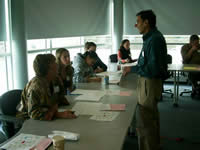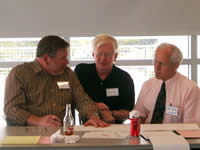TYS at University of Connecticut, Avery Point
- Catherine Cramer
 |
 |
On October 6 2006, ocean scientists, graduate students and science teachers gathered at the Avery Point campus of the University of Connecticut for a Telling Your Story workshop. The workshop was arranged by Connecticut Sea Grant. Led by facilitators Harold McWilliams and Nick Haddad of TERC, the five-hour session gave the scientists useful tools for preparing for a successful visit to a classroom. Science teachers from local schools gave an insiders’ perspective to the discussion. ``A visit from a working scientist gives kids a true vision of what a scientist does,’’ said Frank LaBanca, who has taught science for 11 years at the Newtown, Connecticut high school. ``For high school kids who are thinking about career options, this can have a big effect.’’ The experience of meeting a scientist is valuable for middle school students as well. ``Many middle school kids have never met a scientist before,’’ said Beth Troeger, who has taught middle school science for 24 years in Norwich, Connecticut. ``They’re surprised to see that scientists aren’t guys in white coats! And for some of them it may be an experience that affects their life choices.’’ Researcher and veteran classroom visitor Alison MacDonald gave the scientist’s perspective on the visit. ``For me, it’s an ego trip,’’ said Alison. ``The kids are really excited, they ask interesting questions. It’s a lot of fun; I like to show them things I really enjoy. And these days you are required to do outreach for grants, so that’s a benefit, too.’’ (Alison is also a graduate of Telling Your Story and has participated in COSEE-NE’s OSEI project.) Teachers find benefits as well. ``It’s professionally enriching,’’ said Frank. ``It’s a great way to learn about what’s new in science, to form partnerships with scientists, to make connections with possible mentors for students so they can be involved in cutting edge research.’’ Harold and Nick gave researchers ideas on how to effectively tell the three stories that are most interesting for students: Why is your research interesting and important? How did you become a scientist and what is your work like? How do you do science as part of a team of colleagues? In addition, they explained why pre-visit planning is so important. ``Planning protects you and the kids and make your visit more successful,’’ said Harold. ``This really is the beginning of a possibly long term relationship. Flexibility is key. You have to ask yourself, `What can I do and commit to if I find the right teacher to work with?’’’ Beth spoke of the challenges that also come with a scientist’s visit to the classroom. ``The teacher is always hoping it can develop into more than a one-time visit,’’ she said. ``Success starts with the teacher. A one-time visit is easy, but long term is hard. You have to be able to work within curriculum standards, which is an issue with longer term relationships. And the partnership has to work for both people.’’ In order to help researchers develop an exciting topic to bring to the classroom, and one that the students will be able to understand, Harold and Nick led an exercise in concept mapping. The exercise, which involved the researchers drawing a `map’ of their area of research and how it leads to a multitude of possible topics to explore, provided a new way to strategize planning. The researchers then met with the local teachers in small groups, giving them the opportunity to ask questions directly. Finally, the researchers were given information on what to do after the classroom visit: leaving something behind to continue the conversation; considering a longer term partnership with the teacher; being available for further contact; soliciting feedback. In response to the question, ``Did the workshop increase the likelihood that you will visit a classroom or be involved with students and teachers in K-12 schools?’’ in an after-workshop evaluation, participants said they have ``much more confidence in how to approach this now" and ``feel much more confident about it now.’’ Another wrote that the workshop gave her a ``new perspective on what I have to offer.’’ Many of the researchers indicated that they were hoping to arrange for a classroom visit soon.
|
|